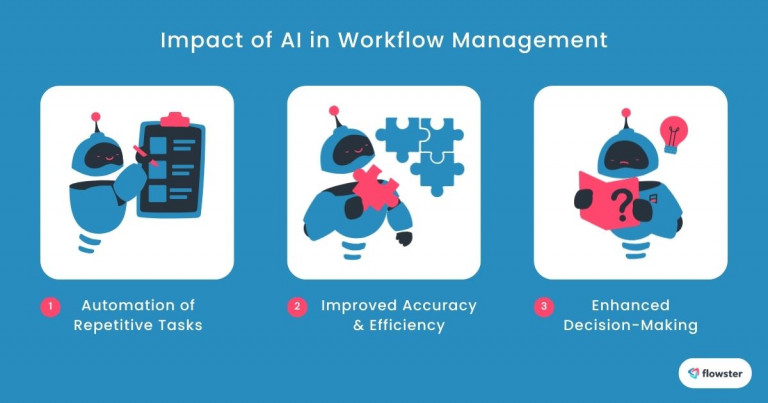With a strong focus on AI in workflow management, industry reports indicate that up to 75% of businesses will adopt AI solutions by 2025 to boost productivity and streamline operations. As artificial intelligence continues to advance, it’s no surprise that it’s also reshaping the way we manage workflows. By automating repetitive tasks, improving accuracy, and enhancing decision-making processes, AI is revolutionizing workflow management, making it more efficient and effective.
AI, or artificial intelligence, is a branch of computer science focused on creating intelligent agents, systems that can reason, learn, and act autonomously. In the context of business operations, AI can be leveraged to analyze vast amounts of data, identify patterns, and make predictions, ultimately leading to better-informed decisions and improved outcomes.
Article Outline
The Impact of AI in Workflow Management
AI is transforming the way businesses operate by automating repetitive tasks, improving accuracy, and enhancing decision-making processes. Let’s delve deeper into how AI is revolutionizing workflow management.
Automation of Repetitive Tasks
Small businesses and solopreneurs often find themselves bogged down by repetitive tasks that consume valuable time and energy. AI-powered tools can automate these tasks, significantly boosting productivity and reducing errors. For instance, AI-powered scheduling tools can automatically optimize schedules based on various factors like employee availability and project deadlines.
Similarly, AI-driven email management tools can sort and prioritize emails, reducing the time spent on email management. Additionally, AI-powered data entry tools can accurately extract data from various sources, eliminating manual data entry errors.
Improved Accuracy and Efficiency
AI algorithms can analyze vast amounts of data to identify patterns, trends, and anomalies that may not be apparent to human analysts. This ability to extract meaningful insights from data empowers businesses to make more informed decisions and allocate resources effectively. AI-powered analytics tools can provide real-time insights into key performance indicators (KPIs), enabling businesses to track progress, identify bottlenecks, and take corrective action.
Enhanced Decision-Making
AI can provide valuable insights and recommendations by analyzing data and identifying potential opportunities and risks. AI-powered chatbots and virtual assistants can streamline communication and improve customer service by answering queries, providing support, and resolving issues efficiently. Furthermore, AI-powered decision-making tools can help businesses identify optimal strategies, forecast future trends, and mitigate risks.
AI can revolutionize your workflow by automating repetitive tasks, improving accuracy, and enhancing decision-making processes. To learn more about the specific ways AI can transform your workflow, check out this insightful article from Flowster: 10 ways to use AI-powered workflow management software.

The Implications for Productivity and Operational Efficiency
The adoption of AI in workflow management has far-reaching implications for productivity and operational efficiency. Let’s explore how AI is reshaping the way businesses work.
Increased Productivity
By automating repetitive tasks, AI frees up employees to focus on more strategic and creative work. This shift in focus can lead to increased productivity and innovation. Additionally, AI-powered tools can help businesses achieve more with fewer resources by optimizing workflows and eliminating inefficiencies.
Improved Operational Efficiency
AI can streamline workflows by identifying bottlenecks, automating tasks, and optimizing resource allocation. By eliminating manual processes and reducing errors, AI can significantly improve operational efficiency. Furthermore, AI-powered analytics tools can provide valuable insights into business performance, enabling organizations to make data-driven decisions that drive growth and profitability.
By automating repetitive tasks, AI frees up employees to focus on more strategic and creative work. This shift in focus can lead to increased productivity and innovation. Additionally, AI-powered tools can help businesses achieve more with fewer resources by optimizing workflows and eliminating inefficiencies. To learn more about how AI-powered task management tools can further streamline your workflow, check out this insightful article from Flowster: How AI Task Management Software Can Get More Done and Save Time.
Flowster's AI-Driven Automation
Getting Started with AI in Workflow Management
Embracing AI in workflow management can yield significant benefits for businesses of all sizes. Let’s explore how to get started with AI and the advantages it offers.
Benefits of Using AI
By implementing AI in workflow management, businesses can experience numerous benefits, including:
- Increased Productivity: Automating repetitive tasks frees up valuable time for employees to focus on strategic initiatives.
- Enhanced Decision-Making: AI-powered analytics tools provide data-driven insights to inform better decision-making.
- Improved Efficiency: Streamlining workflows and eliminating bottlenecks leads to greater operational efficiency.
- Cost Reduction: Automating tasks and optimizing resource allocation can reduce operational costs.
Choosing the Right AI Tools
Selecting the right AI tools is crucial to maximizing the benefits of AI. Consider the following tips when choosing AI tools:
- Identify Your Needs: Determine the specific areas where AI can add value to your workflow.
- Evaluate Your Budget: Consider the cost of AI tools and their long-term return on investment.
- Prioritize User-Friendliness: Choose tools that are easy to learn and use.
- Consider Scalability: Select tools that can grow with your business.
For small businesses and solopreneurs, AI tools like Flowster can be a great starting point. Flowster is a powerful workflow automation platform that empowers users to automate tasks, streamline processes and boost productivity. To get started, explore the free workflow templates available on the Flowster Marketplace.
As AI continues to evolve, it’s clear that it will play a pivotal role in shaping the future of workflow management. By embracing AI, businesses can unlock new opportunities, improve efficiency, and gain a competitive edge. For a comprehensive guide on implementing AI in your business processes, check out Flowster’s insightful article: AI Business Process Implementation: A Step-by-Step Guide.
Capture Your Processes in Minutes!
The Future of Workflow Management: Powered by AI
In conclusion, AI is revolutionizing workflow management by automating repetitive tasks, improving accuracy, and enhancing decision-making processes. By embracing AI, businesses can increase productivity, streamline operations, and gain a competitive edge.
As AI continues to evolve, it’s essential to stay informed about the latest advancements and explore how they can be applied to your specific workflow needs. By leveraging AI, businesses can unlock new opportunities and achieve greater success.
We encourage you to share your experiences with AI in the comments section below. Have you implemented AI in your workflow? What challenges and benefits have you encountered? Let’s learn from each other and embrace the future of workflow management, powered by AI.




